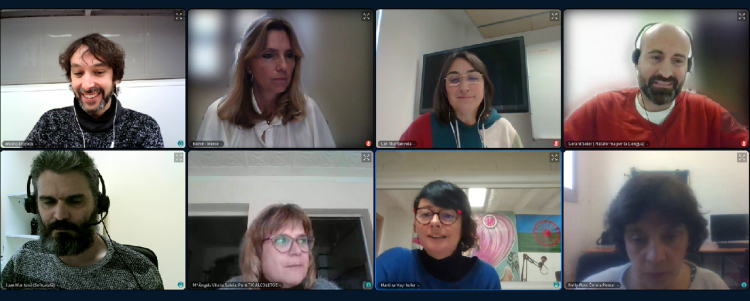Last Thursday, January 25, the Xarxa Punt TIC community, facilitators and managing entities, had the opportunity to learn first-hand about the AINA Program and the promotion of Catalan in the digital world. Specifically, the first virtual meeting of the year 2024 had about fifteen participants, including Gerard Soler from Plataforma per la Llengua and Joan Montané from Softcatalà. Both professionals led the online session which aimed to present the voice donation web platform and give ideas for the programming of related activities at the different Punt TIC.
In the first place, Gerard Soler from Plataforma per la Llengua intervened, who explained that the international Common Voice project put two possibilities on the table: opening the door to citizen participation in the creation of intelligence tools artificial and promote the Catalan language. Soler commented that unfortunately the technology did not have a multilingual criterion and that, therefore, there was a challenge ahead: to make Catalan grow in the digital world. Soler added that campaigns had been carried out with influential people in the territory in order to represent the plurality of the Catalan language. At this point, Soler advanced that Catalan was the first language in the world in hours recorded and validated in Common Voice.
Then, Joan Montané from Softcatalà intervened, who presented the voice donation web platform and its two main roles: Listen and Speak. With the 'Listen' role, volunteers could validate other people's recordings. With the 'Speak' role, volunteers could record their voice. Montané shared that there were currently close to 3,700 hours recorded in Catalan. Next, Montané warned of the lack of female voices, young voices and voices from outside Barcelona and suggested making an impact on this fact in order to be able to correct biases. Montané stated that the vote donation could be done anonymously, although logging in and filling out the profile was recommended. In all cases, Montané asked to take care of three essential data for good indexing: age, gender and variant of Catalan. Montané recalled that the search was not for the best speaker in Catalan, but to generate data so that a robot could understand people. Finally, Montané recommended making sure that participation was done through the Common Voice website in Catalan and announced that the donation of voices would make it possible to have in the future an automatic speech recognition engine, voice assistants or voice services in the Catalan language.
Finally, a round of questions was opened, where some of the facilitators of the Xarxa Punt TIC raised questions and doubts about the operation of the tool and the dynamism of activities.



